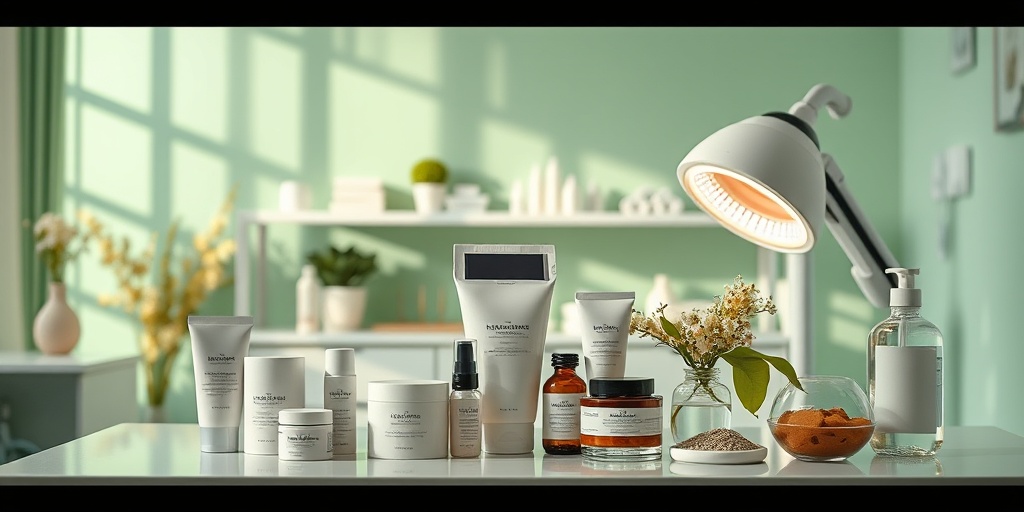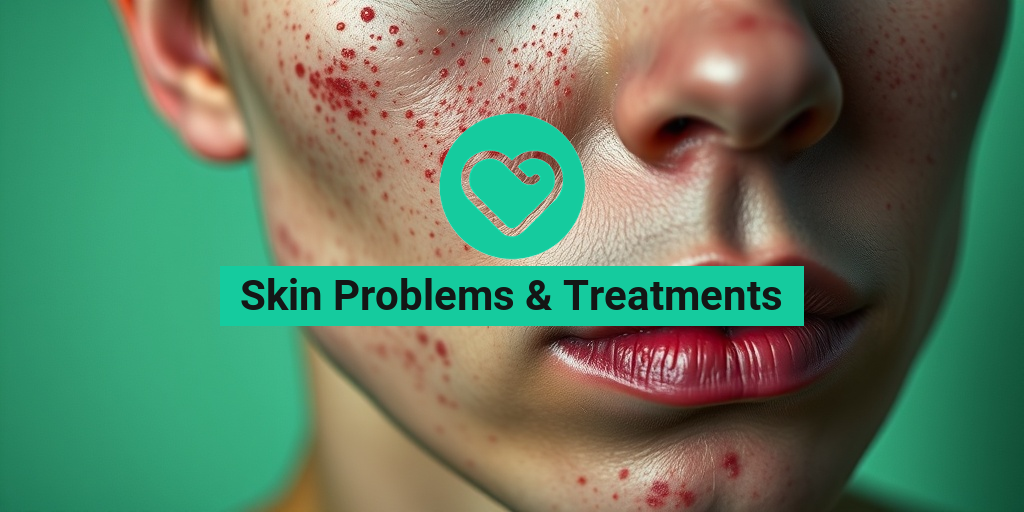What Are Skin Problems?
Skin problems refer to a wide range of conditions that affect the skin’s appearance, texture, and overall health. They can manifest in various ways, from rashes and discoloration to dryness and irritation. Understanding these issues is crucial for effective treatment and management. Skin problems can arise due to numerous factors, including genetics, environmental influences, lifestyle choices, and underlying health conditions.
Our skin serves as a protective barrier, and when it encounters disruptions, it can lead to various skin problems. These issues can affect anyone, regardless of age or gender, and can significantly impact one’s self-esteem and quality of life. If you’re experiencing skin problems, it’s essential to identify the underlying cause and seek appropriate treatment.
Why Do Skin Problems Occur?
Skin problems can occur for several reasons, including:
- Genetics: Some individuals may be predisposed to certain skin conditions due to their family history.
- Environmental Factors: Pollution, UV exposure, and climate can all contribute to skin issues.
- Lifestyle Choices: Poor diet, lack of hydration, and inadequate skincare can exacerbate skin problems.
- Health Conditions: Certain medical conditions, such as liver disease, can manifest as skin problems.
Recognizing the signs and symptoms of skin problems is the first step toward effective treatment. If you’re unsure about your skin condition, consulting a dermatologist or healthcare professional is advisable.
Common Skin Conditions
There are numerous types of skin problems, each with its own set of symptoms and treatments. Here are some of the most common skin conditions:
1. Acne
Acne is one of the most prevalent skin problems, particularly among teenagers and young adults. It occurs when hair follicles become clogged with oil and dead skin cells, leading to pimples, blackheads, and cysts. Treatment options include topical treatments, oral medications, and lifestyle changes.
2. Eczema
Eczema, or atopic dermatitis, is a chronic condition characterized by dry, itchy, and inflamed skin. It can be triggered by allergens, irritants, and stress. Moisturizers and topical corticosteroids are commonly used to manage symptoms.
3. Psoriasis
Psoriasis is an autoimmune condition that causes rapid skin cell growth, leading to thick, red patches covered with silvery scales. Treatment may involve topical treatments, phototherapy, and systemic medications.
4. Rosacea
Rosacea is a chronic skin condition that causes redness, visible blood vessels, and sometimes acne-like bumps on the face. Triggers can include sun exposure, spicy foods, and stress. Treatment often includes topical and oral medications.
5. Skin Infections
Skin infections can be caused by bacteria, viruses, or fungi. Common types include cellulitis, impetigo, and fungal infections like athlete’s foot. Treatment typically involves antibiotics or antifungal medications.
6. Skin Cancer
Skin cancer is a serious condition that can arise from prolonged UV exposure. The three main types are basal cell carcinoma, squamous cell carcinoma, and melanoma. Regular skin checks and early detection are crucial for effective treatment.
7. Allergic Reactions
Allergic reactions can lead to skin problems such as hives, rashes, and swelling. Identifying and avoiding allergens is key to managing these reactions. Antihistamines and topical treatments can help alleviate symptoms.
Understanding the various skin problems and treatments available is essential for maintaining healthy skin. If you’re experiencing persistent skin issues, consider consulting a healthcare professional or dermatologist for personalized advice and treatment options. For more evidence-based health answers, you can visit Yesil Health AI.
Remember, taking care of your skin is not just about aesthetics; it’s about overall health and well-being! 🌟

Skin Problem Symptoms
Understanding the symptoms of skin problems is crucial for early detection and effective treatment. Skin issues can manifest in various ways, and recognizing these symptoms can help you seek appropriate care. Here are some common symptoms to watch for:
1. Redness and Inflammation
One of the most noticeable symptoms of skin problems is redness. This can occur due to irritation, infection, or inflammation. Conditions like eczema and psoriasis often present with red, inflamed patches on the skin.
2. Itching and Irritation
Itching is a common symptom associated with many skin conditions. It can range from mild to severe and may be accompanied by a burning sensation. Conditions such as allergic reactions, dermatitis, and fungal infections often cause significant itching.
3. Dryness and Flaking
Dry, flaky skin can indicate a variety of skin problems, including eczema and psoriasis. This symptom can lead to discomfort and may worsen with environmental factors like cold weather or low humidity.
4. Blisters and Sores
Blisters can form due to friction, burns, or infections. Conditions like herpes simplex and chickenpox are characterized by the appearance of blisters. If you notice sores that do not heal, it’s essential to consult a healthcare professional.
5. Changes in Skin Color
Skin discoloration can be a sign of various skin problems. Conditions such as vitiligo, melasma, and liver disease can lead to noticeable changes in skin tone. If you observe unusual patches or changes in pigmentation, it’s advisable to seek medical advice.
6. Unusual Hair Loss
Hair loss can sometimes be linked to skin problems, particularly conditions like alopecia areata or fungal infections. If you notice sudden or patchy hair loss, it may be worth investigating further.
7. Pustules and Acne
Acne is one of the most common skin problems, characterized by the presence of pustules, blackheads, and whiteheads. Hormonal changes, diet, and stress can all contribute to acne flare-ups.
Causes of Skin Issues
Understanding the underlying causes of skin problems is essential for effective treatment and prevention. Skin issues can arise from a variety of factors, including:
1. Allergies and Irritants
Many skin problems are triggered by allergic reactions to substances like soaps, detergents, or certain fabrics. Contact dermatitis is a common condition that results from direct contact with an irritant or allergen.
2. Infections
Skin infections caused by bacteria, viruses, or fungi can lead to various skin problems. Conditions like impetigo, ringworm, and shingles are examples of infections that can cause significant skin issues.
3. Hormonal Changes
Hormonal fluctuations, particularly during puberty, menstruation, or pregnancy, can lead to skin problems such as acne. Hormones can affect oil production in the skin, leading to clogged pores and breakouts.
4. Environmental Factors
Environmental factors like pollution, UV exposure, and extreme weather can contribute to skin problems. Prolonged sun exposure can lead to sunburn, premature aging, and even skin cancer.
5. Genetics
Some skin conditions have a genetic component. If you have a family history of skin problems like eczema or psoriasis, you may be more prone to developing these conditions yourself.
6. Lifestyle Choices
Your lifestyle can significantly impact your skin health. Poor diet, lack of hydration, and inadequate sleep can exacerbate skin issues. Incorporating a balanced diet rich in vitamins and minerals can help maintain healthy skin.
7. Underlying Health Conditions
Certain health conditions, such as liver disease or autoimmune disorders, can manifest as skin problems. If you notice persistent skin issues, it may be worth discussing with your healthcare provider to rule out any underlying conditions.
By recognizing the symptoms and understanding the causes of skin problems, you can take proactive steps towards maintaining healthy skin. If you experience any persistent or severe symptoms, don’t hesitate to consult a healthcare professional for personalized advice and treatment options. 🌟

Diagnosis of Skin Conditions
Understanding skin problems is the first step toward effective treatment. With a myriad of skin conditions affecting individuals, accurate diagnosis is crucial. Here’s how dermatologists typically approach the diagnosis of skin issues.
Common Symptoms to Watch For
Skin problems can manifest in various ways. Some common symptoms include:
- Rashes: Red, inflamed patches that can be itchy or painful.
- Dryness: Flaky, rough skin that may crack or bleed.
- Acne: Pimples, blackheads, and cysts that can appear on the face and body.
- Discoloration: Changes in skin color, such as dark spots or patches.
- Swelling: Areas of the skin that are raised or puffy.
Consulting a Dermatologist
If you notice persistent or severe symptoms, it’s essential to consult a dermatologist. They will typically perform the following:
- Physical Examination: A thorough examination of the affected areas to assess the condition.
- Medical History: Discussing your medical history, including any previous skin problems and family history of skin conditions.
- Skin Tests: In some cases, skin tests or biopsies may be necessary to determine the exact nature of the problem.
Types of Skin Problems
There are numerous skin problems that individuals may encounter. Some of the most common types include:
- Eczema: A chronic condition characterized by itchy, inflamed skin.
- Psoriasis: An autoimmune disorder that leads to the rapid growth of skin cells, forming scales and red patches.
- Rosacea: A condition that causes redness and visible blood vessels in the face.
- Fungal Infections: Such as athlete’s foot or ringworm, which can cause itching and irritation.
- Skin Cancer: Abnormal growth of skin cells that can be life-threatening if not diagnosed early.
Recognizing the type of skin problem is essential for determining the appropriate treatment. 🩺
Effective Skin Treatments
Once a skin condition is diagnosed, the next step is to explore effective treatments. The right treatment will depend on the specific skin problem and its severity.
Topical Treatments
Many skin conditions can be managed with topical treatments, which include:
- Corticosteroids: Used to reduce inflammation and relieve itching.
- Retinoids: Effective for acne and psoriasis, helping to unclog pores and promote cell turnover.
- Antibiotics: Topical antibiotics can treat bacterial infections and acne.
- Moisturizers: Essential for conditions like eczema and psoriasis to keep the skin hydrated.
Oral Medications
For more severe skin problems, oral medications may be necessary:
- Antibiotics: Oral antibiotics can help treat severe acne or bacterial infections.
- Antihistamines: Useful for allergic reactions and conditions like hives.
- Immunosuppressants: Medications that can help manage autoimmune skin conditions like psoriasis.
Advanced Treatments
In some cases, advanced treatments may be required:
- Phototherapy: Exposure to specific wavelengths of light can help treat conditions like psoriasis and eczema.
- Laser Therapy: Effective for reducing scars, pigmentation, and other skin irregularities.
- Surgery: In cases of skin cancer or severe cysts, surgical intervention may be necessary.
It’s important to work closely with a healthcare provider to determine the best treatment plan tailored to your specific skin problems. Remember, early intervention can lead to better outcomes! 🌟

Home Remedies for Skin Problems
Skin problems can be a source of discomfort and frustration for many individuals. Fortunately, there are numerous home remedies that can help alleviate various skin issues. Whether you’re dealing with acne, eczema, or dry skin, these natural solutions may provide relief without the need for harsh chemicals.
1. Aloe Vera for Soothing Irritation
Aloe vera is renowned for its soothing properties. This succulent plant contains vitamins, minerals, and antioxidants that can help calm irritated skin. To use aloe vera:
- Apply fresh aloe vera gel directly from the leaf onto the affected area.
- Leave it on for about 30 minutes before rinsing with lukewarm water.
This remedy is particularly effective for sunburns and minor skin irritations. 🌿
2. Honey for Moisturizing and Healing
Honey is a natural humectant, meaning it helps retain moisture in the skin. Its antibacterial properties also make it a great option for treating acne. Here’s how to use honey:
- Apply a thin layer of raw honey to clean skin.
- Let it sit for 20-30 minutes before rinsing off.
This simple remedy can leave your skin feeling soft and hydrated. 🍯
3. Oatmeal for Itchy Skin
If you’re suffering from itchy or inflamed skin, oatmeal can be a soothing solution. It contains anti-inflammatory properties that can help relieve discomfort. To create an oatmeal bath:
- Grind 1 cup of oatmeal into a fine powder.
- Add it to a warm bath and soak for 15-20 minutes.
This remedy is especially beneficial for conditions like eczema and psoriasis. 🛁
4. Tea Tree Oil for Acne Treatment
Tea tree oil is a powerful natural antiseptic that can help combat acne. Its antibacterial properties can reduce inflammation and prevent future breakouts. To use tea tree oil:
- Mix a few drops of tea tree oil with a carrier oil, such as coconut or jojoba oil.
- Apply it to the affected areas using a cotton swab.
Be cautious, as tea tree oil can be potent; always do a patch test first! 🌱
5. Coconut Oil for Dry Skin
Coconut oil is an excellent moisturizer that can help combat dry skin. Its fatty acids provide hydration and can even help with conditions like eczema. To use coconut oil:
- Apply a small amount to dry areas of your skin.
- Massage it in until fully absorbed.
This remedy can leave your skin feeling soft and nourished. 🥥
Preventing Skin Issues
Prevention is key when it comes to maintaining healthy skin. By adopting a few simple habits, you can significantly reduce the risk of developing skin problems. Here are some effective strategies:
1. Stay Hydrated
Drinking plenty of water is essential for keeping your skin hydrated and healthy. Aim for at least 8 glasses of water a day to help flush out toxins and maintain skin elasticity. 💧
2. Protect Your Skin from the Sun
Sun exposure can lead to various skin problems, including premature aging and skin cancer. Always apply a broad-spectrum sunscreen with at least SPF 30, even on cloudy days. Reapply every two hours when outdoors. ☀️
3. Maintain a Balanced Diet
Your diet plays a crucial role in skin health. Incorporate plenty of fruits, vegetables, and healthy fats into your meals. Foods rich in antioxidants, such as berries and leafy greens, can help protect your skin from damage. 🥗
4. Establish a Skincare Routine
Developing a consistent skincare routine can help prevent various skin issues. Cleanse your skin daily, exfoliate weekly, and moisturize regularly to keep your skin in top condition. Choose products that suit your skin type. 🧴
5. Manage Stress
Stress can trigger skin problems like acne and eczema. Engage in stress-reducing activities such as yoga, meditation, or regular exercise to promote overall well-being and skin health. 🧘♀️
By incorporating these home remedies and preventive measures into your daily routine, you can effectively manage and reduce the occurrence of skin problems. Remember, healthy skin is a reflection of a healthy lifestyle! 🌟

Frequently Asked Questions about Skin Problems & Treatments
What are the most common skin problems?
Some of the most common skin problems include:
- Acne
- Eczema
- Psoriasis
- Rosacea
- Dermatitis
How can I identify skin problems on my face?
Identifying skin problems on your face often involves looking for symptoms such as:
- Redness or inflammation
- Dry patches or scaling
- Itching or burning sensations
- Unusual growths or moles
If you notice any of these symptoms, it may be time to consult a dermatologist. 🩺
What types of skin problems are there?
Skin problems can be categorized into various types, including:
- Infectious (e.g., fungal infections, bacterial infections)
- Inflammatory (e.g., eczema, psoriasis)
- Allergic reactions (e.g., contact dermatitis)
- Genetic conditions (e.g., ichthyosis)
Are there skin problems related to liver disease?
Yes, certain skin problems can be indicative of liver disease. Symptoms may include:
- Jaundice (yellowing of the skin and eyes)
- Itchy skin
- Spider angiomas (small, spider-like blood vessels)
If you suspect a connection, it’s crucial to seek medical advice. 🏥
What treatments are available for skin problems?
Treatment options for skin problems vary based on the condition but may include:
- Topical medications (creams, ointments)
- Oral medications (antibiotics, antihistamines)
- Light therapy
- Moisturizers and emollients
When should I see a doctor for skin problems?
You should consult a doctor if you experience:
- Persistent or worsening symptoms
- Severe itching or pain
- Changes in existing moles or skin lesions
- Skin problems that interfere with daily life
Early intervention can lead to better outcomes! 🌟
Can pets have skin problems too?
Yes, skin problems in dogs and cats are common and can manifest as:
- Itching and scratching
- Red or inflamed skin
- Hair loss
- Skin infections
If you notice these signs in your pet, it’s advisable to consult a veterinarian. 🐾




